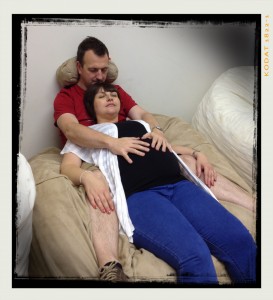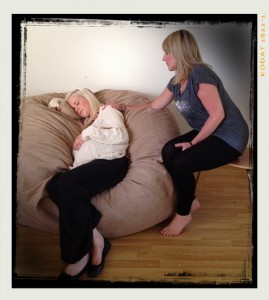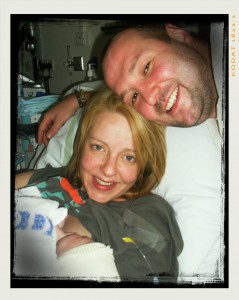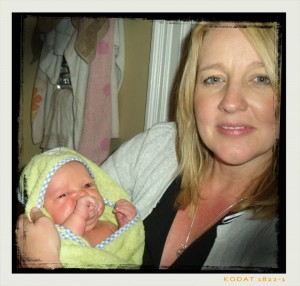HypnoBirthing has become has become very popular in the last couple ten years. With more and more mothers seeking natural pain relief during labour, plus hospitals starting to reduce how frequently they offer drugs to mothers who go into labour – we decided to interview a hypnobirthing practitioner to find out all about the latest tried and tested natural pain control technique that is ‘hypno-birthing’.
Great Health Naturally: What exactly is HypnoBirthing? And please could you explain what is involved when a client uses HypnoBirthing before and during labour.
Tracey Sutton: HypnoBirthing is a complete ante natal birth education programme which teaches relaxation, breathing and visualisations to use during pregnancy and birth along with ways to avoid intervention, remain in control of your birth and work with your body. The classes teach relaxation and breathing that is practiced and used during pregnancy to condition the mind to be able to use the same techniques naturally during their birth for a calm, fear free and satisfying experience.
GHN: So, does a HypnoBirthing practitioner perform hypnosis on the client during the labour or is she not present?
TS: Generally the Mum uses the techniques supported by her partner during the birth but sometimes couples do ask practitioners to help them on the actual day. Most practitioners don’t offer this service anyway and it is important to remember that unless the practitioner is a qualified hypnotherapist then they should only support the techniques not perform them as such.
I do offer a HypnoBirthing partner service as I am a qualified clinical hypnotherapist and professional birth partner (doula). The partner would be the main support but some partners (and Mums) do feel they would rather have myself there to help with the techniques.
GHN: Are there many different styles of hypnosis methods for use during labour? If so which one do you use?
TS: The main hypnosis techniques taught and used in labour are fear release, physical relaxation, deepening and visualisations. Correct breathing is also essential and this is practised regularly too. There are no complex techniques, trickery or stage type hypnosis used!
GHN: What kind of an effect can HypnoBirthing have on a pregnant lady in labour? And what about her pain threshold – does HypnoBirthing replace the need for all drugs and pain suppressing medication during labour?
TS: There are many factors that can affect a birth, some of which are outside our control and like any childbirth preparation class, the success of the techniques is related to the amount of practice a couple put in. Generally around 65-70% of HypnoBirthing mums don’t need any form of pain relief. Around a further 20-25% only require something mild, like gas and air. The remaining 5-10% usually fall into what we call ‘special circumstances’, where medical intervention is required. However, HypnoBirthing mums still say that HypnoBirthing really helped – even if they were induced, or ended up with a cesarean.
The aim of HypnoBirthing is not a completely pain-free and picture-perfect ‘natural’ birth (although that is possible), it is to have a calmer, easier, more comfortable birth – where you are in control – and in a way that most mirrors nature.
GHN: How is the husband or partner involved when the mum-to-be is using HypnoBirthing before the birth and during labour?
TS: During pregnancy the partner practises and supports the Mum with the techniques and breathing so that on the day of the birth he understands what the Mum is doing and can therefore help her through and make sure she is focused, relaxed and breathing correctly to stay in control and maximise the surges (contractions) to the best effect.
GHN: At what stage of pregnancy does the HypnoBirthing practitioner begin her services with the mum-to-be?
TS: I advise couples to start the course as soon as they can after the 20 week scan so they have plenty of time to practice the techniques but I do have couples as late as 36 weeks but this tends to be privately.
GHN: It seems that HypnoBirthing offers more than just hypnosis during labour – that emphasis is placed on the whole body and mind before and during labour. What is the full list of services you offer when a client hires you as their HypnoBirthing practitioner? And is this typical of all HypnoBirthing practitioners?
TS: I do offer a lot more than most practitioners so here is the list…
- Group HypnoBirthing classes
- Private 1:1 classes in South Manchester or even in your own home
- Refresher sessions for subsequent births
- Extra Hypnotherapy sessions for post traumatic births or anything else that may get in the way of you achieving the birth you are planning.
- Hypnosis sessions for phobias such as needles/hospitals.
My main job is as a HypnoBirthing birth support companion, giving support before, during and after birth. During which I offer sessions to everyone on breast feeding and also helping move breech or posterior babies to a more optimal position for birth, acupressure sessions and advice for birth.
As well as the above, I am also trained to advise and sell aromatherapy oils and will soon be offering pregnancy massage. Plus for those interested I loan birth pools for home births and TENS machines.
GHN: Who can use HypnoBirthing, and is there anyone that particularly should or should not use HypnoBirthing?
TS: Everybody can use HypnoBirthing and lots of people believe it should be the normal course on the NHS! It is especially beneficial for Mums/couples who have had a previous traumatic experience or have fears of hospitals/needles/doctors or a fear of giving birth that is so strong they want to opt for a cesarean.
GHN: How do women tend to feel after using HypnoBirthing during labour? As it sounds quite empowering to have learnt the skills and then use them to take control to a large degree over their labour pains?
TS: Women feel elated, satisfied, proud and happy. This creates a happy, calm and relaxed new mum, helping with breast feeding and the general ‘busyness’ of having a new born. HypnoBirthing research suggests no signs of post natal depression due to satisfaction that no matter what path the birth takes – the mum knows she did everything she could and there is no feeling of guilt/lack of control etc.
Partners feel immense bonding with mum and baby and complete satisfaction of having been a good support and actually part of the birth instead of an onlooker.
Babies are usually calmer at birth and afterwards and sleep and feed better.
I also think it is worth mentioning that the NHS are currently looking at putting HypnoBirthing on their list of available services.
GHN: Why do you think people are leaning towards choosing more natural birthing options?
I think views on birth are changing generally and women particularly realise that the experience they have during the birth of their baby, the most amazing experience they will ever have, will affect how they feel about themselves as a woman, a partner and a Mum and that it should be positive and empowering.
Pain relieving drugs are no longer being offered as the norm as they were in the past so couples are looking at other more natural options to protect the baby through the process and remain in control of their own bodies. Intervention rates are much lower with births with no drugs and hospitals are constantly being targeted to reduce intervention and surgery in birth.
NHS antenatal classes are lacking due to time and money and in many areas don’t involve partners and offer very little so HypnoBirthing is seen as a way to solve this. Most HypnoBirthing courses offered through hospitals are still privately paid by the couples and not available free on the NHS. I run classes from my local teaching hospital and work with the midwives to offer HypnoBirthing all be it privately at the moment and it is great to see Midwives referring and supporting it to encourage more couples to try to have as natural a birth as possible.
GHN: Do you have any tips for women when it comes to what they should be looking for in a HypnoBirthing practitioner should they wish to hire one?
That they have the official training from the HypnoBirthing Institute as there are unfortunately people saying they are offering Hypnobirthing classes which are not the same. I would also say that the more experience the practitioner has the better and it would also be an enormous advantage if the practitioner has been a support at HypnoBirths or had one herself. Also, if there is a practitioner linked to the hospital you are booked in at then that would be preferential.
GHN: Finally, any HypnoBirthing practitioner tips that people could apply in their own pregnancy or labour?
TS:
- Relax in between surges, any discomfort goes away completely in between so why be tense?
- Remember to breathe well during the surges to maximise the effect and control oxygen levels to baby and muscle.
- Practice, practice, practice the breathing and techniques before the birth so that on the day it is natural to use them.
- Inform yourself of what may crop up on the day and how to avoid intervention.
- Write a comprehensive birth plan but also have an open mind.
- A couple of links on Hypno Birthing births to watch and learn from are;
More From Tracey on her Real Life Birth Stories & HypnoBirthing
Tracey has been a HypnoBirthing practitioner for 9 years and is based in Sale South Manchester. Couples travel to her classes from as far as Liverpool and North Wales though.
After having a very enjoyable labour with her first child 15 years ago, it was then that she realised the reason behind her positive birthing experience was the focusing and relaxation techniques she employed, instead of fear and tension which is what she was convinced was causing everyone else around her to have negative traumatic times during their births.
For Tracey’s second birth she then bought a book on self-hypnosis and used these techniques and again had an easy birth and this is what prompted her to embark in Clinical Hypnotherapy training so she could share her passion of a calm and enjoyable birth to others who most needed this valuable skill she had learnt.
Whilst training, Tracey found out that HypnoBirthing existed as a programme so then trained as soon as she could and started teaching immediately.
HypnoBirthing, the Mongan method which is the original programme written by a lady called Marie Mongan in America in 1990 to help her own daughters first birth. She wrote the programme as she had two traumatic births herself and wasn’t supported in her desires for a natural calm birth until her third birth where she achieved this using hypnosis.
HypnoBirthing ‘traveled’ to London in the nineties and has since then spread over the UK, becoming increasingly popular more recently all over Britain and the rest of the world through amazing positive research/feedback and the media.



